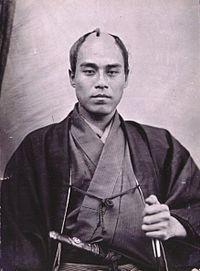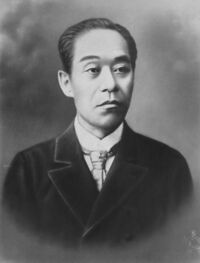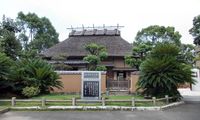فوكوزاوا يوكيتشي
فوكوزاوا يوكيتشي | |
|---|---|
 فوكوزاوا يوكيتشي المتحف الوطني للتاريخ الطبيعي في باريس 1862. | |
| وُلِدَ | Not recognized as a date. Years must have 4 digits (use leading zeros for years < 1000). |
| توفي | Not recognized as a date. Years must have 4 digits (use leading zeros for years < 1000). (aged 66) طوكيو، اليابان |
فوكوزاوا يوكيتشي Fukuzawa Yukichi Fukuzawa Yukichi (福澤 諭吉, 1و. 10 يناير 1835 – ت. 3 فبراير 1901)، كاتب ياباني، أستاذ ومترجم وسياسي وكان من قام بتأسيس جامعة كيئو أول جامعة في اليابان.
كانت لأفكاره حول الحكم والسياسة تأثير كبير على تطور اليابان أثناء فترة ميجي، ويعد من أحد مؤسسي نهضة اليابان الحديثة.
. . . . . . . . . . . . . . . . . . . . . . . . . . . . . . . . . . . . . . . . . . . . . . . . . . . . . . . . . . . . . . . . . . . . . . . . . . . . . . . . . . . . . . . . . . . . . . . . . . . . . . . . . . . . . . . . . . . . . . . . . . . . . . . . . . . . . . . . . . . . . . . . . . . . . . . . . . . . . . . . . . . . . . . .
السيرة الذاتية


ولد يوكيتشي لعائلة منخفضة الترتيب في طبقة الساموراي من عشيرة أوكودايرا في ناكاتسو، محافظة أويتا عام 1835. كانت عائلته فقيرة بعد وفاة والده وفي عمر 14 عاما دخل يوكيتشي مدرسة هولندية. في عام 1853 طلب أخوه الأكبر منه السفر إلى ناگاساكي حيث كانت مستعمرة هولندية قد أنشأت، ونصحه بتعلم اللغة الهولندية لعله يتعلم كيفية تصنيع الأسلحة والمدافع الأوروبية. في ناغاساكي لمع نجم يوكيتشي في ناگاساكي على نجم أستاذه أوكوداير إكي ولهذا خطط أوكوداير للتخلص من يوكيتشي في ناغاساكي فأوصل له رسالة ملفقة على أن أمه مريضة وأن عليه العودة إلى بلدته. إلا أن يوكيتشي اكتشف كذب القصة وخطط للرحيل إلى إيدو لإكمال دراسته التي لا يستطيع إكمالها في بلدته، إلا أن والدته طلبت منه البقاء وأن يدرس في مدرسة تيكيجوكو. درس يوكيتشي في تيكيجوكو لمدة ثلاث سنوات وأصبح متمكنا من اللغة الهولندية، وعين المدرس الرسمي لنطاق عائلته ثم أرسل إلى طوكيو لتدريس إقطاعيي الأسرة هناك.
في العام التالي لوصوله إلى طوكيو فتحت اليابان ثلاث موانئ للسفن الأمريكية والأوروبية فذهب يوكيتشي إلى كاناگاوا لمقابلة الأجانب. إلا أنه صدم عندما اكتشف أن التجار الأوروبيون يتكلمون الإنكليزية وليس الهولندية إلا أنه في ذلك الوقت كان مترجموا اللغة الإنكليزية اليابانية قلائل والمعاجم غير متوافرة لذا كانت دراسته تتقدم ببطء.
عندما قرر الشوگون إرسال مبعوث إلى الولايات المتحدة تتطوع فوكوزاوا في خدمة المبعوث. وصلت البعثة إلى سان فرانسيسكو عام 1860 وبقيت هناك لمدة شهر تمكن أثنائها يوكيتشي من أخذ صورة مع فتاة أمريكية (وكانت الصورة من أشهر الصور في التاريخ الياباني) وكذلك حصل على معجم وبستر بدأ به دراسة اللغة الإنكليزية بشكل جدي.
بعد عودته عام 1860 أصبح يوكيتشي المترجم الرسمي لحكومة توكوگاوا. في فترة قصيرة أخرج أول كتبه للطبع وكان قاموس ياباني إنكليزي بعنوان كايه تسوغو مترجم من قاموس صيني إنكليزي والذي كان الفاتحة لكتب متعددة بعدها.
أعماله
كانت معظم أعمال يوكيتشي في فترة ميجي حيث نشر سبعة عشر جزءا من كتاب "التشجيع على الدراسة"، حيث وضح في هذه الكتب ضرورة إتاحة فرص التعلم للجميع بشكل متساوي. وكان فوكوزاوا يوكيتشي هو مؤسس جامعة كيئو أول جامعة في اليابان.
قاموس الانجليزية اليابانية
All the countries of the world, for children written in verse
تشجيع التعليم
الخطوط العريضة لنظرية الحضارة
النقد
الإرث
قائمة المراجع
كتب الياباني أصلية
- English-Japanese dictionary (Zōtei Kaei Tsūgo, 1860)
- Things western (Seiyō Jijō, 1866, 1868 and 1870)
- Rifle instruction book (Raijyū Sōhō, 1867)
- Guide to travel in the western world (Seiyō Tabiannai, 1867)
- Our eleven treaty countries (Jyōyaku Jyūichi-kokki, 1867)
- Western ways of living : food, clothes, house (Seiyō Isyokujyū, 1867)
- Handbook for soldiers (Heishi Kaicyū Binran, 1868)
- Illustrated book of physical sciences (Kinmō Kyūri Zukai, 1868)
- Outline of the western art of war (Yōhei Meikan, 1869)
- Pocket almanc of the world (Shōcyū Bankoku-Ichiran, 1869)
- English parliament (Shin-ei Kosai-shimatsu, 1869)
- Sino-British diplomatic relations (Eikoku Gijiindan, 1869)
- All the countries of the world, for children written in verse (Sekai Kunizukushi, 1869)
- Daily lesson for children (Hibi no Oshie, 1871)
- Book of reading and penmanrship for children (Keimō Tenarai-no-Fumi, 1871)
- Encouragement of learning (Gakumon no Susume, 1872–1876)
- Junior book of ethics with many tales from western lands (Dōmō Oshie-Gusa, 1872)
- Deformed girl (Katawa Musume, 1872)
- Explanation of the new calendar (Kaireki-Ben, 1873)
- Bookkeeping (Chōai-no-Hō, 1873)
- Maps of Japan for children (Nihon Chizu Sōshi, 1873)
- Elementary reader for children (Moji-no-Oshie, 1873)
- How to hold a conference (Kaigi-Ben, 1874)
- An Outline of a Theory of Civilization (Bunmeiron no Gairyaku, 1875)
- Independence of of the schplar's mind (Gakusya Anshinron, 1876)
- On decentalization of power, advocating less centalized government in Japan (Bunkenron, 1877)
- Popular economics (Minkan Keizairoku, 1877)
- Collected essays of Fukuzawa (Fukuzawa Bunsyū, 1878)
- On currency (Tsūkaron, 1878)
- Popular discourse on people's rights (Tsūzoku Minkenron, 1878)
- Popular discourse on national rights (Tsūzoku Kokkenron, 1878)
- Transition of people's way of thinking (Minjyō Ittushin, 1879)
- On national diet (Kokkairon, 1879)
- Commentary on the current problems (Jiji Shōgen, 1881)
- On general trends of the times (Jiji Taiseiron, 1882)
- On the imeprial household (Teishitsuron, 1882)
- On armament (Heiron, 1882)
- On moral training (Tokuiku-Ikan, 1882)
- On the independence of learning (Gakumon-no Dokuritsu, 1883)
- On the national conscription (Zenkoku Cyōheiron, 1884)
- Popular discourse on foreighn diplomacy (Tsūzoku Gaikōron, 1884)
- On Japanese womanhood (Nihon Fujinron, 1885)
- On men's moral life (Shijin Syoseiron, 1885)
- On moral conduct (Hinkōron, 1885)
- On association of men and women (Nannyo Kosairon, 1886)
- On Japanese manhood (Nihon Nanshiron, 1888)
- On reverence for the Emperor (Sonnōron, 1888)
- Future of the Diet; Origin of the difficulty in the Diet; Word on the public secuity; On land tax (Kokkai-no Zento; Kokkai Nankyoku-no Yurai; Chian-Syōgen; Chisoron, 1892)
- On business (Jitsugyōron, 1893)
- One hundred discourses of Fukuzawa (Fukuō Hyakuwa, 1897)
- Foreword to the collected works of Fukuzawa (Fukuzawa Zensyū Cyogen, 1897)
- Fukuzawa sensei's talk on the worldly life (Fukuzawa Sensei Ukiyodan, 1898)
- Discourses of study for success (Syūgyō Rittishihen, 1898)
- Autobiography of Fukuzawa Yukichi (Fukuō Jiden, 1899)
- Reproof of "the essential learning for women"; New essential learning for women (Onnadaigaku Hyōron; Shin-Onnadaigaku, 1899)
- More discourses of Fukuzawa (Fukuō Hyakuyowa, 1901)
- Commentary on the national problems of 1877; Sprit of manly defiance (Meiji Jyūnen Teicyū Kōron; Yasegaman-no Setsu, 1901)
. . . . . . . . . . . . . . . . . . . . . . . . . . . . . . . . . . . . . . . . . . . . . . . . . . . . . . . . . . . . . . . . . . . . . . . . . . . . . . . . . . . . . . . . . . . . . . . . . . . . . . . . . . . . . . . . . . . . . . . . . . . . . . . . . . . . . . . . . . . . . . . . . . . . . . . . . . . . . . . . . . . . . . . .
الترجمات الإنجليزية
- The Autobiography of Yukichi Fukuzawa, Revised translation by Eiichi Kiyooka, with a foreword by Carmen Blacker, NY: Columbia University Press, 1980, ISBN 0-231-08373-4
- The Autobiography of Yukichi Fukuzawa, Revised translation by Eiichi Kiyooka, with a foreword by Albert M. Craig, NY: Columbia University Press, 2007, ISBN 978-0-231-13987-8
- The Thought of Fukuzawa series, (Paperback) Keio University Press
- vol.1 An Outline of a Theory of Civilization. 2008. Translation by David A. Dilworth, G. Cameron Hurst, III. ISBN 978-4-7664-1560-5
- vol.2 An Encouragement of Learning. 2012. Translation by David A. Dilworth. ISBN 978-4-7664-1684-8
- vol.3 The Autobiography of Fukuzawa Yukichi. 201?. (forthcoming)
- vol.4 Essays on Family and Women. 201?. Revised translation and with an introduction by Helen Ballhatchet. (forthcoming)
الهوامش
انظر أيضاً
المصادر
- Michael Adas (1993). Turbulent Passage: A Global History of the Twentieth Century. Longman Publishing Group. ISBN 0-06-501039-6.
{{cite book}}: Unknown parameter|coauthors=ignored (|author=suggested) (help) - Nishikawa, Shunsaku (1993), "FUKUZAWA YUKICHI1 (1835-1901)" (PDF), Prospects: the quarterly review of comparative education (UNESCO) vol. XXIII (no. 3/4): 493–506, http://www.ibe.unesco.org/fileadmin/user_upload/archive/publications/ThinkersPdf/fukuzawe.pdf
قراءات أخرى
- Lu, David John (2005), Japan: A Documentary History: The Dawn of History to the Late Tokugawa Period, M.E. Sharpe, ISBN 1-56324-907-3
- Kitaoka, Shin-ichi (March/April 2003), "Pride and Independence: Fukuzawa Yukichi and the Spirit of the Meiji Restoration (Part 1)", Journal of Japanese Trade and Industry (Japan Economic Foundation), Archived from the original on 2003-03-31, http://web.archive.org/web/20030331142744/http://www.jef.or.jp/en/jti/200303_019.html
- Kitaoka, Shin-ichi (May/June 2003), "Pride and Independence: Fukuzawa Yukichi and the Spirit of the Meiji Restoration (Part 2)", Journal of Japanese Trade and Industry (Japan Economic Foundation), Archived from the original on 2003-05-06, http://web.archive.org/web/20030506055242/http://www.jef.or.jp/en/jti/200305_025.html
- Albert M. Craig (2009), Civilization and Enlightenment: The Early Thought of Fukuzawa Yukichi (Hardcover ed.), Cambridge: Harvard University Press, ISBN 978-0-674-03108-1
- Tamaki, Norio (2001), Yukichi Fukuzawa, 1835-1901: The Spirit of Enterprise in Modern Japan (Hardcover ed.), United Kingdom: Palgrave Macmillan, ISBN 0-333-80121-0
وصلات خارجية
- Fukuzawa, Yukichi | Portraits of Modern Japanese Historical Figures (National Diet Library)
- "Encouragement for Learning" (Gakumon no Susume) by Fukuzawa Yukichi (Part One, English Translation)
- E-texts of Fukuzawa's works at Aozora Bunko (Japanese)
- CS1 errors: extra text: volume
- CS1 errors: unsupported parameter
- Persondata templates without short description parameter
- مواليد 1835
- وفيات 1901
- كتاب يابانيون
- معلمون يابانيون
- كتاب من أوساكا
- أشخاص من فترة-ميجي اليابان
- جامعة كيو
- Brown University people
- University and college founders
- أكاديميون يابانيون
- Meiji Restoration







